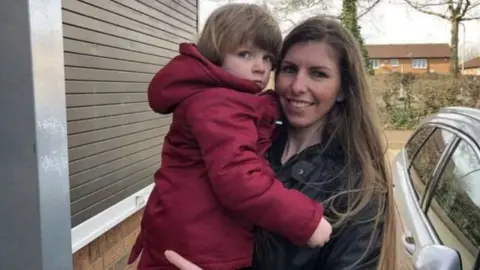Energy price cap: 'Half a million in Wales face unaffordable energy'
 Efi Nydrioti
Efi NydriotiHalf a million people in Wales could find energy bills unaffordable by October, a charity has warned.
From today a rise in the UK energy price cap means the typical household will pay £693 a year more for electricity and gas.
Mum-of-three Efi Nydrioti said she's been forced to choose between affording heating and food.
The UK government said its offer of £350 per household would "ease" anxiety.
But Welsh government said the scheme has "fallen short of the urgent action people need".
Friday's energy bill rise comes on top of soaring living costs and a record rise in petrol prices.
Efi Nydrioti, from Cardiff, said: "Our bills have gone up so much.
"If it were me, I'd put up with it, but is has been so cold for the kids, I've had to just pay it and lost out in other areas, like food shopping."

Mother-of-three, Emma Jones, from mid-Wales, said: "I don't know how much more I can cut back.
"I am constantly worried about how I am going to cope when the energy prices go up, I just don't know what to do, I can't win."
And mother-of-four Gemma Matthews, from Carmarthenshire, said: "Everything is increasing, and we're struggling.
"With everything going up, we scrape by every month; it's difficult.
"With Universal Credit, I don't know if they'll cover my price increase? Do I either keep the house warm, so my children don't get ill, or put food on the table, so they don't go hungry?
"No mother should have to choose between eating or heating."
Citizens Advice Cymru (CAC) said many people cannot afford the rise, and face another one in six months' time.
"It's already having an impact on people. It's already affecting people's choices," said CAC's head of policy Luke Young.
"How they choose to heat their homes and what they choose to buy, and this before the price cap has even been lifted.
"From today, energy prices go up by as much as 54%, what that means is that households will see their bills going up around £2000 a year - that is going to have an impact on people's ability to pay," he added.
Mr Young said the situation could get even worse if the prices cap increases again in the autumn.
"We are deeply concerned that we could end up half a million people in Wales unable to afford their energy bills.
"We feel that both governments need to be doing all that they can - they need a crisis response to cost of living crisis.
"As it currently stands we don't feel that the combined action of the Welsh and UK governments really meets the scale of the challenge that households will be facing from today," he said.

Chief executive of the charity Home-Start Cymru, Bethan Webber, said: Without taking action, families will fall into problem debt that will affect them for years to come.
"We need action now to support households, and make sure families can afford the ongoing increased costs for the months and years to come."
'Hot meal or heat'
The cap, which is announced every six months, sets the price suppliers can charge for each unit of energy as well as the standing charge.
In October last year, those on standard tariffs, with typical household levels of energy use, saw bills go up by £139 to £1,277 a year.
From 1 April, fuel bills for about 18 million households on standard tariffs will climb to £1,971.
That could put 280,000 households in Wales in fuel poverty, an increase of 100,000 households since October, according to fuel poverty charity, National Energy Action.
Head of the charity in Wales Ben Saltmarsh said families on the lowest incomes will have to choose "whether to cook a hot meal or heat their homes".
"This is absolutely going to be very tough for a lot of people and few of us will be unaffected by these price rises, for those on the lowest incomes living in the least efficient homes, this is simply devastating.
"This is the biggest energy price shock that we've seen in living memory, and hundreds of thousands of people in Wales, will be priced out of an essential service of having adequate levels of heating and power.
"We can't have people huddled in one room because that's all they can afford - It could be detrimental to their health and well-being," he said.
 Getty Images
Getty ImagesHe added that "to its credit, the Welsh government has intervened to support low-income households, announcing a £330m package of support", but the way in which the UK government had handled the crisis had been "wholly inadequate".
"The £200 energy bill rebate is basically a loan, and that is extremely inappropriate to expect low income families to pay that back - low income families should be exempt from repaying that loan," he said.
"The UK government's response in our view has been woefully inadequate, it's left households without choices, simply the cold truth here is not enough financial support has been made available that's proportionate to the crisis," he said.
'Decisive action'
A UK government spokesperson said: "We recognise the pressures people are facing with the cost of living, which is why we have set out a £22bn package of support.
"This includes a £150 council tax rebate from April, and a further £200 energy bill discount in October to cut energy bills quickly for the majority of household, while the energy cap continues to insulate millions of customers from volatile global gas prices."
A Welsh government spokesperson said: "The Welsh government has taken decisive action to support with the cost of living crisis, and since last November we've made £380 million available to support people across Wales, which is above and beyond the equivalent support available in England."
They added: "If the UK government is serious about supporting people, it must reverse the cruel decision to remove the £20 uplift to Universal Credit, which would provide people with much-needed financial relief.
"We have also suggested a number of other measures to the UK government, including introducing a low income energy tariff to better target support to lower income households, and providing further and increased support through the Warm Home Discount and other winter fuel payment scheme," they added.

- LESSONS FROM LOCKDOWN: How has the experience of lockdown changed us?
- WILD MOUNTAINS OF SNOWDONIA: Five farming families open their gates and share their lives

